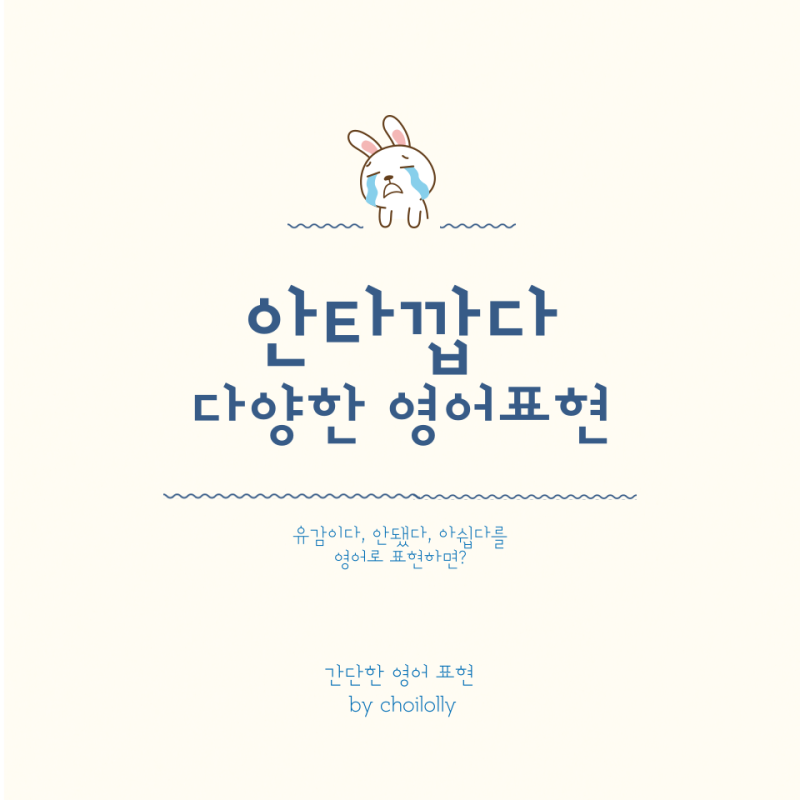너무 아쉽다 영어로
“너무 아쉽다”는 한국어에서 자주 나오는 표현 중 하나입니다. 이 표현을 영어로 어떻게 표현할 수 있는지 알아보도록 하겠습니다.
1. “I’m really disappointed”와 “I’m so frustrated”의 차이점은?
“너무 아쉽다”를 영어로 표현하기 위해 “I’m really disappointed”와 “I’m so frustrated”라는 표현을 사용할 수 있습니다. 이 두 표현의 차이점은 감정의 성격에 있습니다.
“I’m really disappointed”는 주로 기대했던 것이 일어나지 않거나 받아들일 수 없는 결과에 대한 실망을 나타냅니다. 예를 들어, 시험에서 좋은 성적을 받기를 기대했지만 좋은 결과가 아니었을 때 “I’m really disappointed”라고 표현할 수 있습니다.
한편, “I’m so frustrated”는 주로 지속적으로 일어나는 어려움이나 걸림돌에 대한 좌절감을 나타냅니다. 예를 들어, 계속해서 실패를 경험하고 있다면 “I’m so frustrated”라고 표현할 수 있습니다.
2. 다른 감정과 함께 사용하는 표현들
“너무 아쉽다”는 다른 감정과 함께 사용되기도 합니다. 예를 들어, “I’m really disappointed and angry”는 실망뿐만 아니라 분노도 느끼고 있다는 뜻입니다.
아울러, “I’m so frustrated and overwhelmed”는 좌절감 뿐만 아니라 압도되는 감정도 함께 느낀다는 뜻입니다.
3. 유사한 표현들 검토하기: “I’m very let down”와 “I’m extremely upset”
“너무 아쉽다”를 다른 방식으로 표현하고 싶다면 “I’m very let down”이나 “I’m extremely upset”과 같은 유사한 표현을 사용해볼 수 있습니다.
“I’m very let down”은 기대했던 것을 실현하지 못해서 실망하는 감정을 나타냅니다. 이 표현은 누구에게서 무언가를 기대했는데 그 기대에 부응하지 않았을 때 사용할 수 있습니다.
한편, “I’m extremely upset”은 극도로 흉하게 되잖아! 등장인물들이 흉하게 되기 때문에 다가왔으면 하는 어떤 결과나 상황이 매우 실망스럽다는 뜻입니다.
4. 반대되는 의미를 가진 표현들: “I’m pleasantly surprised”와 “I’m really pleased”
“너무 아쉽다”의 반대되는 의미를 가진 표현은 “I’m pleasantly surprised”와 “I’m really pleased” 등입니다.
“I’m pleasantly surprised”는 상황이 더 좋게 전개되었을 때 느끼는 기쁨을 나타냅니다. 예를 들어, 예상치 못한 좋은 결과를 받았다면 “I’m pleasantly surprised”라고 표현할 수 있습니다.
한편, “I’m really pleased”는 매우 만족스러워하고 있다는 뜻입니다. 이 표현은 기대했던 결과를 받았고 그 결과에 만족할 때 사용할 수 있습니다.
5. “너무 아쉽다”를 포함한 일상적인 표현들
“너무 아쉽다”와 관련된 일상적인 표현들을 알아보겠습니다.
– “I’m bummed out”은 실망스러워하거나 기쁨과 행복을 느끼지 못하는 감정을 나타냅니다.
– “I’m feeling down”은 혼란스러움과 좌절감을 나타냅니다.
– “It’s such a shame”은 역설적으로 너무 아쉽고 유감스러워하는 상황을 나타냅니다.
6. 문맥에 맞는 동사와 함께 사용하는 표현들
“너무 아쉽다”를 영어로 표현할 때는 문맥에 맞는 동사와 함께 사용하는 것이 중요합니다.
– “너무 아쉽다”를 표현하는 동사로는 “miss out”이 있습니다. “I’m going to miss out on the opportunity”는 기회를 놓치는 것에 대한 아쉬움을 나타냅니다.
– 또한, “너무 아쉽다”를 나타내는 다른 동사로는 “regret”이 있습니다. “I regret not studying harder”는 공부를 더 열심히 하지 않았다는 사실에 대한 아쉬움을 나타냅니다.
7. 강조의 정도를 다르게 표현하는 방법
“너무 아쉽다”의 강조 정도를 다르게 표현하고 싶다면, “I’m really disappointed” 또는 “I’m extremely frustrated”과 같이 강조하는 단어를 사용해보세요.
8. “너무 아쉽다”를 다른 말로 바꾸어 표현하기
“너무 아쉽다”를 다른 말로 바꾸어 표현하고 싶을 수도 있습니다. 이때 사용할 수 있는 표현으로는 “I’m so sad”나 “I’m deeply upset”이 있습니다.
9. 예시 문장들로 표현력 향상하기
아래에는 “너무 아쉽다”와 관련하여 다양한 문장 예시를 제시하고 있습니다. 이를 통해 표현력을 향상시킬 수 있습니다.
– 헤어지기 아쉽다 영어로: “It’s sad to say goodbye”
– 함께하지 못해 아쉽다 영어로: “I’m disappointed that we couldn’t be together”
– 떠나서 아쉽다 영어로: “I’m sad that you’re leaving”
– 아쉬움이 남는다 영어로: “I’m left with a sense of regret”
– 못만나서 아쉽다 영어로: “I’m disappointed that we couldn’t meet”
– 조금 아쉽다 영어로: “I’m a little disappointed”
– 나는 아쉽다 영어로: “I am sad”
– 아쉽다 영어로 비즈니스너무 아쉽다 영어로: “I’m disappointed with the business”
이렇게 다양한 표현들을 활용하여 영어에서의 “너무 아쉽다”를 표현하는 방법을 익힌다면 좀더 다양한 감정과 상황을 표현할 수 있게 될 것입니다.
자주 사용되는 표현들을 알아둘 수록, 영어 표현력은 더욱 풍부해질 것입니다. 잘 활용하여 다른 사람들과 의사소통할 때 정확한 감정을 전달할 수 있도록 노력해 보세요.
FAQs (자주 묻는 질문)
Q1: “너무 아쉽다”의 의미와 사용법을 자세히 알려주세요.
A1: “너무 아쉽다”는 기대했던 결과를 받지 못해서 실망하는 감정을 나타냅니다. 이 표현은 “I’m really disappointed”나 “I’m so frustrated”와 같은 영어 표현으로 전환할 수 있습니다.
Q2: “너무 아쉽다”와 유사한 표현에는 어떤 것들이 있나요?
A2: “너무 아쉽다”와 유사한 표현으로 “I’m really let down”이나 “I’m extremely upset” 등을 사용할 수 있습니다.
Q3: “너무 아쉽다”를 다른 말로 바꾸어 표현하고 싶을 때 어떤 표현을 사용할 수 있을까요?
A3: “너무 아쉽다”를 다른 말로 표현하고 싶을 때 “I’m so sad”나 “I’m deeply upset”과 같은 표현을 사용할 수 있습니다.
Q4: “너무 아쉽다”를 포함한 다양한 영어 표현을 알려주세요.
A4: “너무 아쉽다”를 포함한 다양한 표현으로 “It’s sad to say goodbye”나 “I’m disappointed that we couldn’t be together” 등을 사용할 수 있습니다. 다양한 표현을 활용하여 영어 표현력을 향상시킬 수 있습니다.
사용자가 검색한 키워드: 너무 아쉽다 영어로 헤어지기 아쉽다 영어로, 함께하지 못해 아쉽다 영어로, 떠나서 아쉽다 영어로, 아쉬움이 남는다 영어로, 못만나서 아쉽다 영어로, 조금 아쉽다 영어로, 나는 아쉽다 영어로, 아쉽다 영어로 비즈니스
Categories: Top 41 너무 아쉽다 영어로
\”아쉬워\”, \”안타까워\”를 영어로 자연스럽게 말하기 | 이영시
여기에서 자세히 보기: muadacsan3mien.com
헤어지기 아쉽다 영어로
헤어지기 아쉽다는 말은 한국어로 뜻 그대로 연인 또는 친구와의 이별이 아쉽다는 감정을 표현하는 표현입니다. 우리말로 익숙하게 쓰이면서도 영어로는 조금 어색하게 느껴질지도 모릅니다. 그렇다면 헤어지기 아쉽다라는 의미를 동일하게 전달할 수 있는 영어 표현은 어떤 것이 있을까요? 이에 대해 알아보면서, 이별의 감정적 과정과 헤어지기 아쉬움에 대해 자세히 알아보겠습니다.
1. 헤어지기 아쉽다의 영어 표현
헤어지기 아쉽다는 영어로 “It’s Sad to Say Goodbye”로 표현할 수 있습니다. “It’s Sad to Say Goodbye”는 어떤 관계에서의 이별에 대한 아쉬움과 슬픔을 나타냅니다. 헤어지기 전에 있는 아쉬움과 이별 후 혼자가 되었을 때의 애틋한 감정도 함께 담고 있습니다.
2. 헤어지기 아쉬움의 감정적 과정
헤어지기 아쉬움은 이별 후에도 오랫동안 계속되는 감정적인 과정입니다. 처음 이별 소식을 들은 순간부터 시작되며, 이를 받아들이지 못하고 충격과 부도덕감을 느낄 수 있습니다. 시간이 지나면서 분노와 비난, 그리고 슬픔과 혼자가 되는 것에 대한 외로움이 더해집니다. 헤어지면서 함께 했던 추억들이 떠올라 미련과 아쉬움이 깊어지기도 합니다.
또한, 이별 후에도 서로에 대한 그리움이 지속될 수 있고, 상처를 치유하면서도 잊지 못할 기억들이 어느 정도 남아있게 됩니다. 이 감정들은 서서히 시간이 지나며 사라지기도 하지만, 때로는 다른 인연을 만든다 해도 완전히 사라지지 않을 수도 있습니다.
3. 헤어지기 아쉽다의 이유
헤어지기 아쉽다는 주로 두 가지 이유로 인해 발생할 수 있습니다. 첫째, 연인이나 친구와의 관계가 끝났을 때에도 그들의 존재감과 기억이 여전히 남아있기 때문입니다. 함께했던 순간들이나 그들과 함께 보냈던 소중한 시간들이 아직까지 여운을 남기기 때문에 헤어지기 아쉬움을 느끼게 됩니다.
둘째, 헤어진 상대방에게 대한 애정이 남아 있기 때문입니다. 한쪽이 다른 한쪽보다 더 애정을 가지고 있거나, 서로 간에 여전히 애정이 남아있는 경우에는 헤어지기 아쉽다는 감정을 더욱 강하게 느낄 것입니다.
4. 헤어지기 아쉽다와 관련된 자주 묻는 질문들
Q1. 헤어지기 아쉬움을 어떻게 극복할 수 있을까요?
헤어지기 아쉬움을 극복하는 데에는 시간과 헤어진 상황에 따라 다양한 방법을 사용할 수 있지만, 주변 사람들과의 이야기나 새로운 활동과 관심사를 찾아보는 것이 도움이 될 수 있습니다. 이는 새로운 환경과 새로운 사람들을 만나면서 헤어지기 아쉬움에 대한 집착을 완화시킬 수 있기 때문입니다.
Q2. 헤어질 때 미리 얘기하는 것이 좋을까요?
헤어지기 아쉬움을 느끼는 경우라면, 상대방에게 먼저 이별을 전하고 이유를 얘기하는 것이 좋을 수 있습니다. 이는 서로를 위한 예의와 상호 존중을 보여주기 때문입니다. 그러나 이는 상황에 따라 다를 수 있으므로 자신이 편안한 방법을 선택하는 것이 중요합니다.
Q3. 헤어지기 아쉬운 상대방에 대해 연락할 때는 어떻게 해야 할까요?
헤어질 때 미리 얘기했더라도, 일부 사람들은 상대방에 대한 그리움이나 아쉬움을 표현하기 위해 연락을 하는 경우가 있을 수 있습니다. 이 경우, 헤어진 이유와 이별 후 서로의 개인 공간을 존중해야 합니다. 상대방에게 연락을 할 때, 서로를 괴롭히거나 불편하게 하지 않도록 주의해야 합니다.
헤어지기 아쉽다는 감정은 우리 모두가 일생 동안 한 번쯤은 경험할 수 있는 감정입니다. 헤어지기 아쉬움은 이별로 인한 아픔이나 애증을 겪게 됩니다. 그러나 시간이 지나면서 이러한 아픔을 극복하고 새로운 시작을 찾을 수 있습니다. 헤어지기 아쉽다는 감정을 대하는 방법은 각자 다를 수 있지만, 미래의 행복을 위해 앞으로 나아가는 것이 중요합니다.
함께하지 못해 아쉽다 영어로
Introduction:
The Korean phrase “함께하지 못해 아쉽다” (hamkke haji mothaeyasipda) can be roughly translated to “I regret not being able to be together.” It expresses the feeling of disappointment and longing caused by missed opportunities to spend time with loved ones or engage in shared experiences. This emotional sentiment is universal and relatable, as everyone has experienced the pang of regret when they couldn’t be with someone or missed out on a rewarding experience.
Exploring the Meaning and Impact:
The phrase “함께하지 못해 아쉽다” encapsulates the essence of longing for cherished moments that could have been. It acknowledges the irreplaceable value of shared experiences and emphasizes the significance of human connection in our lives. This feeling is intensified when reflecting on the limitations imposed by circumstances or personal choices that prevent us from being together.
At times, missed opportunities can stem from geographical or temporal barriers, such as being physically distant or occupied with other commitments. In today’s globalized world, where families and friends are often dispersed across different countries or busy with demanding schedules, the yearning for togetherness can grow stronger. Additionally, this sentiment can also emerge from past experiences that were not fully appreciated or understood in the moment, leading to a retrospective sense of loss.
The regret of not being able to be together can manifest in various contexts and across different relationships. It may occur between romantic partners, family members, close friends, or even professional colleagues. The depth of this emotion is subjective and depends on the level of connection and attachment involved.
FAQs:
Q: How can I cope with the regret of not being able to be together?
A: Coping with the regret of missed opportunities can be challenging, but here are a few strategies to help you navigate through these emotions:
1. Acknowledge and accept your feelings: Allow yourself to feel and process the disappointment and regret. Suppressing these emotions may prolong the healing process.
2. Communicate and express: Reach out to the person you missed being with and share your feelings openly. Honest communication can foster understanding and provide a sense of catharsis.
3. Focus on the present: While it is natural to dwell on the past, shifting your focus to the present can help you appreciate the moments you have right now and find alternative ways to connect with loved ones.
4. Learn from the experience: Use the regret as an opportunity for personal growth and self-reflection. Identify patterns or obstacles that hindered togetherness and aim to overcome them in the future.
5. Create new opportunities: Look for alternative ways to strengthen your bond. Whether through virtual gatherings, planning future trips, or taking up shared hobbies, seeking out opportunities for connection can help alleviate regrets.
Q: How does the regret of not being able to be together affect relationships?
A: The regret of not being able to be together can leave a deep impact on relationships. It may lead to a sense of unfulfilled emotional needs and dissatisfaction. However, it can also act as a catalyst for proactive efforts to maintain and strengthen relationships moving forward, emphasizing the importance of seizing opportunities for togetherness.
Q: Can the pain of missed opportunities be overcome?
A: While the pain of missed opportunities may never completely disappear, it can be gradually diminished through time and healing. Finding alternative ways to connect and creating new memories can help alleviate the weight of regret. Focusing on personal growth and cultivating a positive mindset can also contribute to overcoming the pain associated with missed opportunities.
Conclusion:
함께하지 못해 아쉽다 encapsulates the bittersweet feeling of missed opportunities and unfulfilled togetherness. It serves as a reminder of the value of human connection and the importance of cherishing the moments we have with loved ones. By acknowledging and coping with this regret, we can navigate through the complex emotions it evokes, ultimately striving to create meaningful connections and shared experiences in our lives.
떠나서 아쉽다 영어로
The phrase “떠나서 아쉽다” encompasses a range of emotions, including longing, yearning, and remorse. It is typically used to express a sense of regret for leaving something behind and a desire to return to it. This sentiment can be applied to various aspects of life, such as leaving a beloved hometown, departing from a supportive community, or parting ways with close friends or family. While the literal translation of “떠나서 아쉽다” is “I regret leaving,” its true essence often goes beyond these words, evoking a profound sense of nostalgia and a longing for what once was.
In Korean culture, there is a strong emphasis on the importance of family, community, and roots. Koreans often have a deep attachment to their hometowns, as these places hold significant memories, experiences, and connections. The phrase “떠나서 아쉽다” reflects this sentiment, as it captures the yearning for the familiar and the desire to be reunited with one’s past. It encapsulates a deep appreciation for the bonds formed in familiar environments and highlights the human tendency to regret the choices or circumstances that have led to separation from these significant aspects of life.
The phrase can also be used to express regret for leaving a specific experience, such as a memorable trip or a fulfilling job. It reflects the sentiment that one had a great time during a certain period but now realizes the loss or absence of that enjoyment. This highlights the value of being present in the moment and cherishing the experiences as they unfold, as one may come to regret leaving or moving on from them.
Moreover, “떠나서 아쉽다” can also be used in a romantic context, symbolizing the regret felt after ending a relationship or leaving a loved one. It conveys the feeling of yearning for the past, wishing for what could have been, and lamenting the loss of a connection that was once cherished. This usage emphasizes the emotional depth and complexity of the phrase, as it encompasses not only the physical act of leaving but also the emotional repercussions that follow.
FAQs:
Q1: Is “떠나서 아쉽다” only used for physical departures?
A1: No, although “떠나서” directly translates to “leaving,” the phrase can be used to express regret or longing for any experience, situation, or person that one has left behind.
Q2: Is “떠나서 아쉽다” a commonly used phrase in Korea?
A2: Yes, this phrase is quite commonly used in Korean society. It reflects the cultural value placed on nostalgia, family, and roots, and is frequently used to express a bittersweet sentiment at leaving something behind.
Q3: How can “떠나서 아쉽다” be used in a sentence?
A3: Here are a few examples:
– When leaving your hometown: “고향을 떠나서 아쉽다” (I regret leaving my hometown).
– After a memorable trip ends: “여행이 끝나서 아쉽다” (I regret leaving the trip).
– When ending a romantic relationship: “헤어진 후에도 그를 떠나서 아쉽다” (Even after breaking up, I regret leaving him).
Q4: Can “떠나서 아쉽다” be used to express regret for a decision?
A4: While the phrase is commonly used for physical departures, it can also be used to express regret for choices made or opportunities missed. The underlying sentiment of longing and remorse remains the same.
In conclusion, the phrase “떠나서 아쉽다” captures the essence of nostalgia, longing, and regret that arises when one realizes the true worth of something they have left behind. It reflects the cultural significance placed on family, community, and roots in Korean society, as well as the deeper emotional impact of separation. Whether it is used to express leaving a physical place, a memorable experience, or a loved one, this phrase encapsulates the complex emotions associated with the regret of departing from something once cherished.
주제와 관련된 이미지 너무 아쉽다 영어로

너무 아쉽다 영어로 주제와 관련된 이미지 22개를 찾았습니다.






![영어 상황] 못 온다고?? 아쉬워 ㅠㅠ 영어로 표현하기 아쉽다 영어로 - YouTube 영어 상황] 못 온다고?? 아쉬워 ㅠㅠ 영어로 표현하기 아쉽다 영어로 - Youtube](https://i.ytimg.com/vi/I0G6nm0T7rQ/maxresdefault.jpg)

















![올리버쌤 영어꿀팁] 올리버쌤 영어꿀팁]](https://i.ytimg.com/vi/4x_5ZNVOc7Y/maxresdefault.jpg)









![유용한 영어표현] l 코로나 언제 끝나 영어로 l 출근길 3분 영어 유용한 영어표현] L 코로나 언제 끝나 영어로 L 출근길 3분 영어](https://img1.daumcdn.net/thumb/C176x176/?fname=https://blog.kakaocdn.net/dn/bBIhB3/btqXN9sM237/AkDB3VUaqRMbqLs5bukAn0/img.jpg)









Article link: 너무 아쉽다 영어로.
주제에 대해 자세히 알아보기 너무 아쉽다 영어로.
- 아쉽다 영어로, That’s too bad는 이제 그만! | Engoo 블로그 – 엔구
- 아쉽다, 안타깝다 – 매일 조금씩하는 영어공부 – 티스토리
- “아쉽다!” 영어로 어떻게 말하나요? – English
- “아쉽다”를 영어로? – OWL Dictionary
- 너무 아쉬운데 영어로 표현이 안될땐? – 해보면 알수있지
- 한국인이 자주 쓰는 “아쉽다”라는 말을 영어로 하면? – G2E
- 유감이다, 아쉽다 영어로. It’s too bad that, It’s a shame that.
더보기: muadacsan3mien.com/tin-tuc